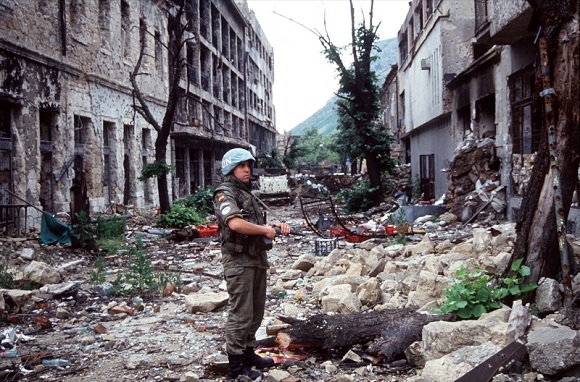Bosnia – identity should go hand-in-hand with reconciliation
A Ugandan perspective on the problems faced by Bosnia and Herzegovina, calling for the country’s citizens to build a new relationship amongst themselves; based upon a real understanding of each other’s respective needs, fears and aspirations.
Suggested Reading |
Conflict Background |
GCCT |
By Richard Obedi
Post-Dayton Bosnia and Herzegovina (BiH) – split along ethno-national lines into three constituent people – denies its citizens the possibility of embracing a civic, unifying identity. This complex lack of a single identity – one that ties individuals to the country – contributes to fuelling persistent instability, confusion and uncertainty.
Given this absence of a unifying identity, the best option is, in my view, to strengthen civic democratic participation, as Jasmin Mujanović has proposed. The citizens of BiH need to build a new relationship amongst themselves; based upon respect, a real understanding of each other’s needs, fears and aspirations, existing habits and patterns of cooperation. This provides the best safeguard against a return to violent division.
Ever since Uganda attained its independence, the country’s youth have been confronted with social economic and political problems, whose root causes have not been effectively addressed. There is increasing ethnic tensions, acute land pressures, widening economic divides, deepening socio-political cleavages and corruption. Ethnicity, politics and economy intersect to shape Ugandan society across the whole country. Country-wide, Ugandans identify more closely with their respective tribal identities than with the broader Ugandan national identity. Other problems include civil conflicts, land conflicts, corruption, ineffective and inappropriate education systems, unemployment, HIV/AIDS, rapid population growth and abject poverty.
However, amidst all the above differences, we have common aspects that can unite us – especially when our existence as a people is threatened. For those in BiH, a bad precedent had already been set by its past leaders and the framers of the current constitution, which marginalizes certain segments of the population. If not discontinued, this will only tear the country apart.
In post-war societies where past injustices remain unresolved, there exists a latent risk of renewed outbreaks of violence, years and even decades later. The views expressed by young people interviewed in a documentary, entitled ‘Naši Narodi? Moji Identiteti: Four Youth Perspectives on National Identity in Post-Dayton Bosnia and Herzegovina’ – which explores the perspectives of Mirza, Leila, Lana and Dejan on the issue of national identity in the post-war context – is representative enough, and their respective perceptions of identity and national reconciliation must not be ignored and or remain largely unstudied.
The perceptions of young Bosniaks, Serbs and Croats on national identity can provide an important basis for understating people’s various understandings of national identity, as shaped by political, economic and security concerns. Young people’s perceptions and interpretations of identity can have a tremendously important impact on national reconciliation.
Reconciliation is important in conflict prevention, co-existence and nation building. It is an over-arching process which includes the search for truth, justice, forgiveness and healing. It involves finding a way to live alongside former enemies; not necessarily to love them, or forgive them, or forget the past in any way, but to foster sense of co-existence and co-operation that lays the basis for a better life together. BiH urgently needs to pursue a comprehensive process of national reconciliation. And of course, this should be executed in good faith and in a manner that achieves sustainable peace and development, whilst building a dynamic and harmonious society.
Richard Obedi is executive director of The Populace Foundation-Uganda (TPF-Uganda), a member of the Global Coalition for Conflict Transformation.



















